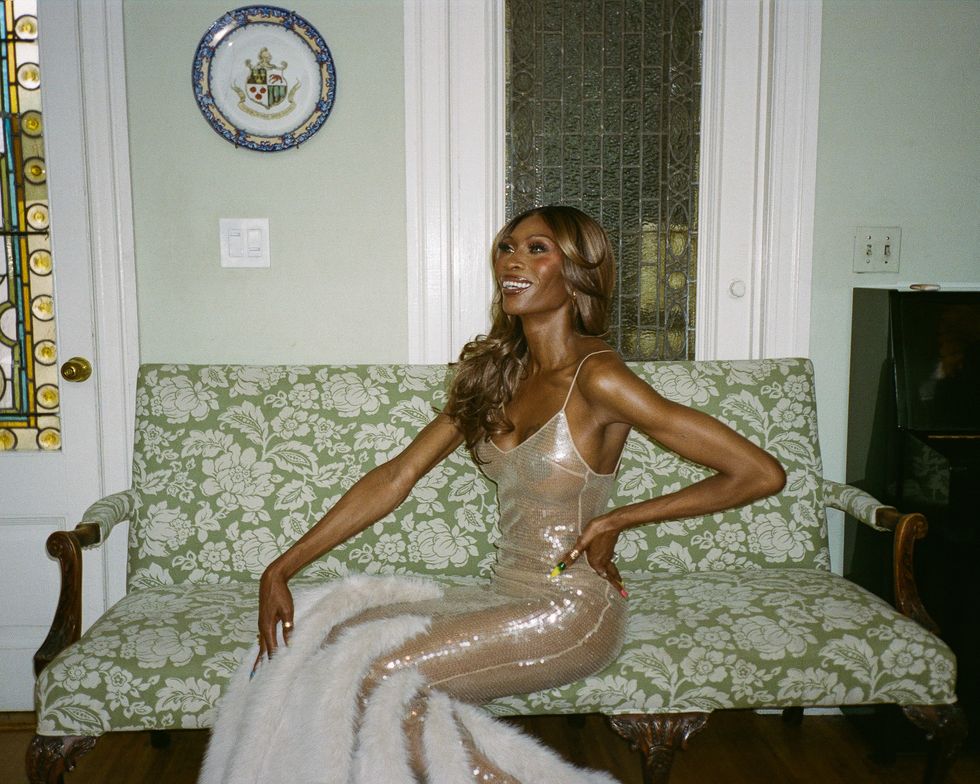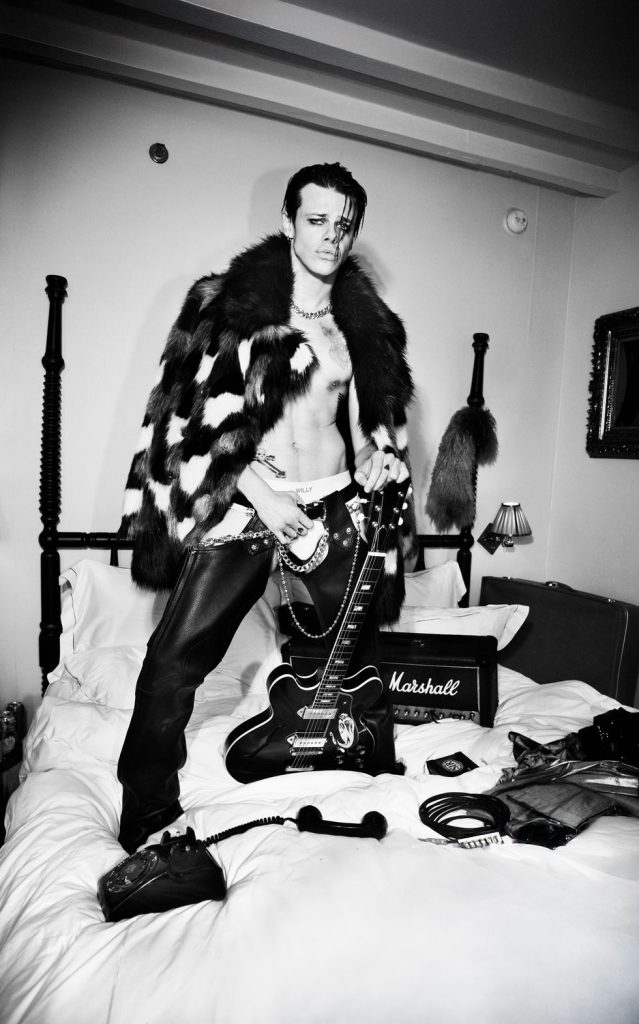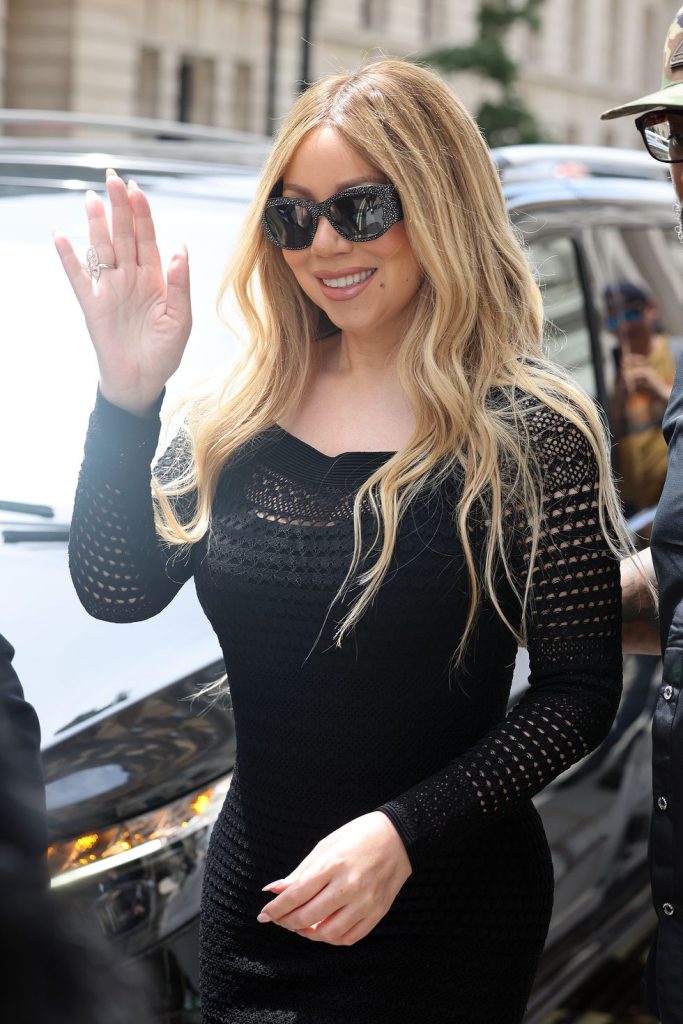

Popularity is relative, especially in the digital age. You could have hundreds of thousands of followers online but be completely unknown in the streets — massively famous on Instagram, YouTube or Twitter, but lack any kind of real, authentic cool in person. For our series Coolest Person in the Room, we pinpoint all the people whose energy is contagious regardless of their following count or celebrity. For this edition, we caught up with Dominique Jackson, actor, model and queer icon.




How are you?
I am doing well despite the fact that this has been a very tough period from the time that the inauguration started. You know, I did Pose, which was such a beautiful experience and so amazing from the outside. But a lot was going on: I went through a divorce and got into a new relationship. There were all the negative comments and the death threats. Actually Brad Simpson, one of the producers of Pose, saw me at the first premiere and he instilled in me something that was therapy for ages: enjoy the moment, don’t float above it and don’t get lost in it. I had to really keep that in the back of my head constantly because I always felt like I was going to lose it.
But after I came off of Pose, I wanted to go right back to work. I was fighting for work. I did American Horror Stories and other things. You know, it was like at that point you’re popular and famous and being celebrated everywhere — and you know I suffer from agoraphobia so it was really a push to keep going outside and showing up and moving along. When the strike came along I was devastated but it helped to calm me. It helped to slow the pace and I was able to start to breathe again. I was able to enjoy the house that I bought and then get back to work. But unfortunately once the strike was over, Trump started to campaign and work started to dwindle. Before you knew it, he won the campaign and there was no work.
Wow, I never put that timeline together like that.
Yeah. Once the inauguration occurred, many of my bookings for colleges and stuff were cancelled. I totally understand, because you can’t provide payment to me if you don’t have any funding.
Right, like what’s going on with Columbia and all those schools.
I was offered to go to this really prestigious school and they offered me $300 versus in 2019 when I went there and it was $15,000. And while it’s not about the money, it is about the money, because I have to feed myself and pay my bills.




You have to finish paying for the house!
Exactly. So after the inauguration was over, I was down. The agoraphobia set back in, I didn’t want to leave the house. But I saw my community was suffering. I saw people like my sister Tabytha Gonzalez who were still pushing and out there. People like Jonovia Chase who just produced the Fem Queen Honors event at The Apollo. They were still out there, so I used the drive they had to push myself back out. Now, we are working with the I’m Your Venus project, we are working with Garden State to purchase that house Venus Xtravaganza lived in, turning it into a museum and making it a resource center for the girls in New Jersey. Garden State has also made Venus House one of their programs, so we are building that out. We want to put something like Destination Tomorrow in Jersey in a space of celebration — this is a space of yes, she may have passed away but because of her sacrifice we now stand strong and stand tall.
So when you ask how I am, I’m a bit busy but not busy.
You mentioned agoraphobia: You seem to love TikTok and I’m curious if that’s a way for you to interact while sort of still being alone.
Yes! TikTok and social media is a great way to interact when you don’t want to be outside. I read my comments and so many people have said I inspire them. That’s not what I set out to do. I was just trying to live my life. I was trying to do more than survive, I was trying to show my family that being of trans experience did not mean that you were a degenerate. And that took a lot of work for me. I had to become a television star to make that point to my family. I was really working to show I’m not an abomination — I fought hard to get to these spaces.
I had suffered an incident at the airport in Puerto Rico in 2007. I didn’t have my green card and I was detained. That really scared me, so once I got back to New York I shut in. The only way I would go outside was to make money. I would take a few shots and it would take me an hour, but I would go out to make money. When I got into therapy, my therapist said I might have a form of agoraphobia. My response was “I’m Black, we outside! All day, all night, we outside.” And she said, “Do it without drinking,” and that’s when I realized it was bad. In 2014, I had another incident where someone tried to strangle me on the way home. A man just started following me.
I was telling people I didn’t know him and he would laugh it off and say I was drunk. I jumped off the train and thought I lost him but later he jumped out of nowhere and just started choking me. He was telling me he liked me and all this stuff but he was choking me and I gave up. And next thing I know I opened my eyes and it was my neighbor there helping me up. That all contributed to me not feeling safe going outside.



I was just at Fem Queen Honors, where you were given an award. In your speech, you talked about how Tracey Africa Norman had inspired you, which I thought was so beautiful.
Shatera Revlon showed me Paris Is Burning, and it didn’t really do it for me but what got me was the fact that Venus was murdered. That stuck with me the rest of my life. So I was looking around at the life we were living. It was like five of us in a studio apartment sleeping on the mattress having balls at night. And while it was fun, I was like this is no life for us. We have to work, we have to go out into the world and do things. Shatera told me I could become a model. She was like, “Your runway is everything, and you’re real. You can become a model.”
She started to give me the rundown of Tracey Africa, who was modeling and really doing it. At the time, I didn’t even know they outed her and how they treated her, but when I found that out, it gave me even more motivation. And so I started doing fashion shows at these Jamaican events. But knowing that Tracey’s career happened helped me. People would say, “Oh you know she failed,” she did not fail. And I was saying this in the ‘90s. She did not fail, she showed us it could be done. I found someone I could really relate to and saw myself in. That’s why Tracey will always be one of my icons.
Do you remember the first film or TV project you did?
Christopher Street: The Series with Dwight Allen O’Neal. I played a nurse in 2009. Then I did the Trellis Project, I played in Incongruence. That was when I knew I could memorize lines because it was monologue — a lot of monologue, and the whole thing was about Carla Pridgen and I had two weeks to learn the whole thing.
I saw this clip on TikTok of you from a 1995 episode of Jerry Springer — I know some of the girls used to do the show!
Oh my gosh! I haven’t seen it. Do you have it? Why was it going around?


I do. I can send it! I think people just saw it and your name was credited as Heidi so everyone was sort of like … we know who “Heidi” is.
It was one of the last episodes that was not violent. Eve Harlow, who rescued me, took me to Philadelphia, allowed me to stay with her and get myself together. She took me to Jerry Springer with her and Jasmine because Jasmine was going to tell this story of her and this guy named CJ. So we all go and my guy at the time came and I decided I wasn’t going to tell him I was trans in the kitchen or the bathroom — that was a part of safety. We thought the show was going to bring visibility and show the world that trans people could be loved. But I think parts of that went left.
For me, it went great, because me and that guy did date for quite a while after that. Eve chose the name Heidi for me. But then after we did it, Brittany from Philadelphia went, and that’s when the violence started. They asked us to come back but I said no because of the violence.
I know Pose changed your career, but did the show change you as a person?
Pose confirmed my personality. I always felt that I was too soft, too kind. I felt like I was the girl always getting hurt. I would help people put on this great event or great show and then realize I was the only one not getting paid. I felt like I was always getting overlooked. Once Pose came, here I was in this major role, and people began to say I changed. And I didn’t change, they just didn’t have access to me any more in the way they wanted to. So now they were angry with me.
Then there were the people who felt I should have taken care of them — that my success was their success. So I really had to realize that I had to think about myself. You can not give to people who are not willing to receive or appreciate it. There has to be a limit to giving of yourself, because you can’t give from an empty cup. So a lot of times people that I put my neck out for, the people who I’ve housed and taken care of, will say to me, “You’ve never done anything for me.” In the beginning, I would have cried and felt hurt and tried to find out what I did wrong. Now I don’t do that. Elektra helped me to realize I have strength within me and that it’s okay if I go off. Because when I go off, there’s always a reason. So I don’t have to absorb all of people’s anger. I can defend myself and stand up for myself. I can be grateful for the things I’ve done.
And Pose also taught me I’m a damn hard worker and a determined woman, I can tell you that. To come from the islands with no green card and no support other than my little brother… I was determined.





You mentioned Venus Xtravaganza and the Venus House project. I know you’re also an executive producer on I’m Your Venus, which is now on Netflix. Can you talk about how you got involved with that?
When I came to New York, I came to realize that my only way was sex work — New York was a step up from Baltimore in ballroom, but in Baltimore, I was a waitress, I was going to school. I left school because I was attacked and made unsafe and moved to New York where I was informed of sex work. That’s how we made it.
It was devastating, but they taught me how to use the gift of gab and beauty. Many times it was mostly about the fetish. So sometimes we didn’t really have to do anything. Beverly, who was one of the first women that really embraced me, told me I was beautiful, and she would say, “Little girl, this work is not for you, but you have to do what you have to do to survive.” So I would go talk to these men, but she would remind me to always be on my guard. She told me to make sure they weren’t too much bigger or stronger than I was and to feel them out and bring them to her. That’s how the girls were back then, and this was all because of what happened to Venus. Venus’s murder protected a lot of us, because we now had that fear in us. They would tell us these stories about how in the ‘70s they would take the girls and put them in woodchippers in upstate New York and they would disappear. So I needed this support system from these girls, and I was reminded of Venus every time I left that bar and went somewhere with a man.
In 2020, in the midst of the pandemic Jonovia Chase reached out to me and asked if I wanted to work on the documentary, and I thought, Woah, this is divine guidance. I really believe everything that’s happened to me is divine guidance. I feel like God protects us and guides my path. So it was an honor for me to step on board to this project knowing that every time I saw a man, she flashed across my head.
It was really amazing to watch the documentary all come together. One of the top things I wanted was the families to come together: the Xtravaganzas and the Pellagattis. I wanted the brothers to also be accountable. I didn’t want this polished, airbrushed, Oh, we loved our sister. But Joe and John and Louie, they were all so real and forthcoming. These masculine, manly, traditional men, to hear them talk about what they did to her, how they treated her and how much they missed her was important. To hear them open up and soften was so beautiful. It’s sad that it happened because of her death but because of her death we get to see that. It shows people that ballroom and family are together. It’s not that you’re throwing away your biological family even though they throw you out but you have found family that can help you because your biological family doesn’t know about these things.

What is your next dream?
To continue to work. All the dreams I really had, I did: I bought the house, I have a beautiful relationship, all the things. So right now I’m taking the time to enjoy and maintain everything I have. In getting back to work, my dream is really to continue to work and create art and fantastic art at that. Theatrical art and all sorts of things.
This article is a collaboration between La Roche-Posay and PAPER.
Photography: Diego Villagra Motta
Styling: Angelina Cantú
Hair and makeup: John Mendez
Lighting: Kaiya Lang
Photo assistant: Peter Demas
Styling assistants: Joyce Esquenazi Mitrani, Quinn Tommy Herbert
Production intern: Sophia Martinez
Managing editor: Matthew Wille
Executive creative producer: Angelina Cantú
Story: Mikelle Street
Publisher: Brian Calle



